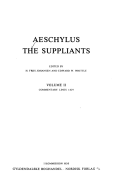
“The guardian of poor suffering mankind.”
Source: The Suppliants, lines 382–383 (tr. Christopher Collard)

The Suppliants , also called The Suppliant Maidens, or The Suppliant Women, is a play by Aeschylus. It was probably first performed sometime after 470 BC as the first play in a tetralogy, sometimes referred to as the Danaid Tetralogy, which probably included the lost plays The Egyptians , and The Daughters of Danaus , and the satyr play Amymone. It was long thought to be the earliest surviving play by Aeschylus due to the relatively anachronistic function of the chorus as the protagonist of the drama. However, evidence discovered in the mid-20th century shows it one of Aeschylus' last plays, definitely after The Persians and possibly after Seven Against Thebes.
“The guardian of poor suffering mankind.”
Source: The Suppliants, lines 382–383 (tr. Christopher Collard)
“Mankind's troubles flicker about, and you'll nowhere see misery fly on the same wings.”
Source: The Suppliants, lines 328–329 (tr. Christopher Collard)
“"Reverence for parents" stands written among the three laws of most revered righteousness.”
Source: The Suppliants, line 707; alternately reported with "Honour thy father and thy mother" in place of "Reverence for parents", in Bartlett's Familiar Quotations, 10th ed. (1919)
“I would far rather be ignorant than knowledgeable of evil.”
Source: The Suppliants, line 453; comparable to "where ignorance is bliss, / 'Tis folly to be wise", Thomas Gray, On a Distant Prospect of Eton College, stanza 10